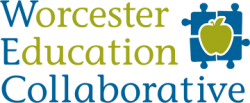On April 28, 2021, the Worcester Education Collaborative (WEC) hosted a Lunch and Learn event focusing on how schools and individual educators can best return to in-person learning after the Covid pandemic closed the schools in March of 2020. This is especially timely, as many schools in Massachusetts, including the Worcester Public Schools, are returning to at least two days per week for in-person learning. While the Department of Education in Washington, D.C. has put out two volumes of guidelines for school reopening, this panel discussed how the Covid pandemic has illuminated not only the depth of educational inequities but also opportunities to improve the future of education. The panel, hosted by WEC executive director Jennifer Davis Carey, featured Liz Hamilton of the Worcester Boys and Girls Club, Natasha Ushomirsky of The Education Trust, Chad d’Entremont of the Rennie Center, and Maureen Binienda, Superintendent of the Worcester Public Schools. All panelists emphasized that schools prioritize the social and emotional needs of students over curriculum--not only for the immediate return to in-person learning but as a permanent reorientation of the educational ecosystem: people matter more than academics.
Liz Hamilton of The Worcester Boys and Girls Club conveyed the importance of providing for students’ basic needs and providing a safe place for learning. For those kids that were going to be home alone, learning hubs gave students a safe place for remote learning. The Club also hosted a babysitting certification program to help support parents working out of the home. The Club’s food pantry was also expanded and will be maintained after the pandemic.
Liz also emphasized the need for student voice and choice in creating service plans. By listening to students’ input, educators can better understand student needs, while helping students become better at self-management and goal setting. By making decisions with students, and not for them, services can be calibrated to their individual needs. Liz also celebrated that in the remote learning period, teachers reached out more, and created stronger bonds with families--something that should continue after the pandemic is over. They will also continue the Power Hour student support with tutoring, SAT prep, and driver’s education.
Natasha Ushomirski of The Education Trust recommended that the 1.6 billion dollars in federal Covid relief for Massachusetts education should be used to remedy pre-existing inequities made worse by the pandemic and remote learning. Areas of focus include creating learning environments that support and affirm all students, meeting students where they are academically and help them thrive, closing the digital divide, recruiting, and retaining more teachers of color, engaging families, and communities as indispensable partners, and strengthening students’ transition to college and the workforce. The relief funding would cover staffing costs, provide training on restorative practices and culturally responsive discipline, revise curriculum to be culturally responsive, offer summer enrichment and acceleration programs for “unfinished learning” (not “learning loss”), and provide free, high-quality tutoring.
Chad d'Entremont of the Rennie Center provided a snapshot of education in the Covid era, with a growing digital divide, some students being lost from the system during remote learning, “unfinished learning” (or “learning loss”), and the exacerbation of pre-existing disparities, traumas, and instability. He emphasized that social and emotional needs are the most critical to address through transformative social-emotional learning and justice-oriented citizenship; this is true-- pandemic or not. He suggested that schools re-engage students through prioritizing attendance (and reconnecting students to school), rethinking discipline towards restorative (not punitive) justice, supporting both non-academic and academic needs, and focusing on individualized, competency-based learning. He gave examples of schools that would reflect how we can take the lessons of the Covid period and reconsider what constitutes model schooling. The Baker School in Brockton addresses trauma through healing-centered practices and the affirmation of student identities. Salem’s Carlton School features multi-age classrooms, with personalized learning and student's voice, and goal setting. Brookline’s Alternative Choices in Education features student responsibility for their learning with six-week mini-courses and electronic roadmaps to track their progress.
Maureen Binienda, WPS superintendent, has been evaluating WPS’s progress during the Covid lockdown through the lens of equity. She was happy to report that the 5-year technology goal of a device for every student, with hotspots providing internet access, has been achieved in the past year. WPS has also been doing quite a bit of training to be culturally responsive, looking at school and district culture to identify any unconscious bias undermining equity. In fact, WPS will be starting a virtual school, as well as a dual Spanish and English language school. There will also be summer school featuring enrichment and acceleration programs to confront the “unfinished learning” of the past year.
WPS is also working on integrating UDL into the teaching practice throughout the district. UDL, or Universal Design for Learning, is an approach to teaching and learning that emphasizes presenting curriculum in multiple formats so that it can be universally received (received by all learners), multiple ways to interact with curriculum material, and multiple ways to motivate and engage students in their contact with the curriculum. UDL emphasizes flexibility to address the strengths and needs of all students. Federal funding has been used to implement UDL across the country under the Every Student Succeeds Act (ESSA) in 2015.
Ultimately, the panel agreed that the most critical part of the return to in-person learning in the schools is addressing the social and emotional needs of students before academics. There is much to be learned from both the breakdowns and successes during the period of remote instruction--and requires a reorientation of the educational ecosystem. Addressing the basic, non-academic needs of students is the priority, to support students’ physical, psychological, and social wellbeing. Only then can students learn effectively. Furthermore, the equity should be the focus of change in the schools, to make education for all--not just some. With greater equity, teachers can help students become all that they can be and help society be inclusive and healthy.
Written by Shawn Ryan, Worcester Education Collaborative




















